Mythbusters
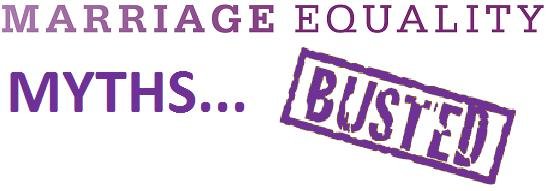
- A Civil Partnership is the same as a civil marriage
- The definition of marriage is between a man and a woman
- Irish people are against the idea of extending marriage to same sex couples
- Marriage is a religious institution. Marriage is about getting married in a church.
- Marriage is about procreation. Children need a mother and a father
- Extending marriage to same sex couples would require a referendum to change the Irish Constitution
A Civil Partnership is the same as a civil marriage

Although civil partnership in Ireland marked an important step in relationship recognition for lesbian, gay, bisexual and transgender people, there is still some work to be done to reach our ultimate goal of equality for same sex couples, our families and our children. We’ve identified over 160 statutory differences between civil partnership and civil marriage. Through our work with elected representatives and our allies in the Dáil and Seanad, we have been able to close many of these gaps – including many around finance and taxation.
And yet some very important inequalities remain. For example, Civil Partnership:
- does not permit children to have a legally recognised relationship with their parents - only the biological one. This causes all sorts of practical problems for hundreds of families with schools and hospitals as well as around guardianship, access and custody. In the worst case, it could mean that a child is taken away from a parent and put into care on the death of the biological parent.
- does not recognise same sex couples' rights to many social supports that may be needed in hardship situations and may literally leave a loved one out in the cold.
- defines the home of civil partners as a "shared home", rather than a "family home" , as is the case for married couples. This has implications for the protection of dependent children living in this home and also means a lack of protection for civil partners who are deserted.
Loving, committed relationships between two consenting adults should be treated equally, regardless of gender or sexual orientation. Same sex couples should be allowed to share the same responsibilities, obligations and respect that marriage provides.
It makes no sense to exclude loving couples already doing the work of marriage in their daily lives – supporting one another, raising families, etc – from the legal structure intended to reinforce that dedication, those meanings, and – at its heart – commitment and love.
The definition of marriage is between a man and a woman
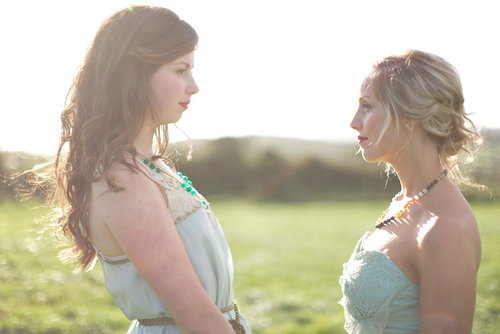 Image by Lisa O’Dwyer Photography & Pearl & Godiva
Image by Lisa O’Dwyer Photography & Pearl & Godiva
(Image by Lisa O’Dwyer Photography & Pearl & Godiva)
You may be surprised to learn that marriage is, and always has been, a dynamic and evolving institution. For example, in the past marriages were primarily about property and wealth, and so the institution of marriage featured traditions like arranged marriages, payment of dowries, polygamy and the legally inferior status of women within marriage. Even as recently as 1996 the Irish understanding of marriage was evolving. Prior to that, the State did not recognise divorces or remarriages.
At various times throughout history society has adapted its understanding of marriage. At a time when arranged marriages were commonplace, it was unheard of for a couple to marry for love. Today, most people would agree that a marriage is an equal, loving partnership - a far cry from the definition of marriage many hundreds of years ago.
It is also important to remember that the campaign for marriage equality is a campaign for civil marriage, not religious marriage. Civil marriage is governed by the State, while religious marriage is governed by individual religious institutions. So although the State definition of who may or may not marry has changed (to include divorced people, for example), religious institutions are not forced to marry anyone they do not wish to.
You might also be interested to learn that - contrary to popular belief - the Irish Constitution does not define marriage as between a man and a woman. It was in fact the 2004 Civil Registration Act that defined marriage as being between a man and a woman, but this legislation could easily be amended at any time to define marriage in gender neutral, inclusive terms.
Article 41.3.1 of the Constitution says only that "The State pledges itself to guard with special care the institution of Marriage, on which the Family is founded, and to protect it against attack."
In the past, the Irish Courts have interpreted marriage as being between a man and a women; however, the Zappone and Gilligan case (ongoing) will present an opportunity for the courts to expand the definition of marriage to include same sex couples.
The Irish Constitution is considered to be a living document that is meant to reflect the changing values of Irish society - values that include family, kinship, love, commitment and respect. At Marriage Equality, we believe that the Constitution's definition of marriage and "the Family" could easily include same sex relationships.
Irish people are against the idea of extending marriage to same sex couples
In fact there is a strong majority of Irish people who support the right of same sex couples to marry, and this majority continues to grow. In the 3 years that Marriage Equality has been working, we've seen popular support for marriage equality grow from 58% in 2008 (Lansdowne) to 73% in 2011 (Red C).
And there are many same-sex couples who are already married. Couples have been legally married in places like Canada, Spain, South Africa... but have returned to Ireland where their marriages are recognised only as civil partnerships. So there already are legally married same sex couples living in Ireland, even if the State doesn't recognise their marriages.
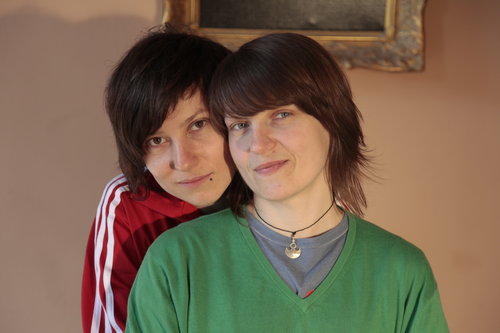
Thanks to campaigning by groups like Marriage Equality and the lobbying efforts of our supporters as part of our Out To Your TD campaign, nearly all political parties in 2011's General Election included marriage equality in their election manifestos. The Constitutional Convention, which starts in early 2013, provides a HUGE opportunity for supporters of marriage equality to engage with the process to make it a reality. Supporters will be able to make the case for provision of equal access to marriage and to show how much support there is for it amongst the public. We have a unique opportunity to inform the Convention and to ensure that a positive recommendation from it issues to Government. This is THE next step to getting marriage equality across the line.
Some people argue that popular support doesn't always translate into winning votes (or referendums). But in the 2012 US elections, we saw 3 states win marriage equality - Maine, Maryland and Washington - by popular vote for the first time ever! In these states, thanks to popular support and the public vote, lesbian, gay, bisexual and transgender people are now able to marry the person they love.
(For more information on Marriage Equality's Out to Your TD campaign, please click here)
Marriage is a religious institution. Marriage is about getting married in a church.
The campaign for marriage equality for same sex couples is about access to civil marriage, not religious marriage. When a couple is married in a civil ceremony at a registry office, religion is not involved. This is because civil marriage is a relationship that is sanctioned and licensed by the State, and does not require the blessing of any religious institution.
Religious marriage is a blessing of a relationship, undertaken in a church or other religious venue. In Ireland, a religious marriage also requires a civil marriage licence to be valid. And no religious institution can be forced to marry two people... even if their marriage is licensed by the State.
Just as Ireland's divorce legislation did not force religious institutions to remarry divorced people, legalising marriage equality will not require these institutions to marry same sex couples - though several religious institutions (the Unitarian Church, the Religious Society of Friends / Quakers, etc) would be happy to do so.
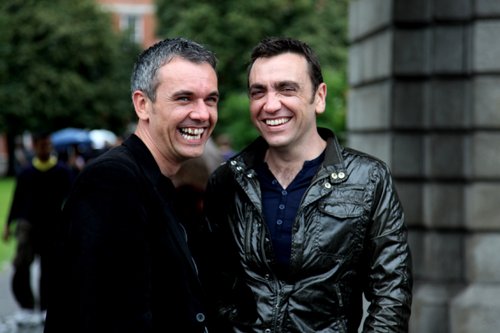
If we legalise marriage equality, 'conscientious objectors' will be punished unfairly.
Thankfully we live in a modern society where it is already illegal to discriminate against someone based on their sexual orientation - lifting the marriage ban for same sex couples won't change that. The same anti-discrimination legislation that exists now will still apply to people who "sell a wide variety of goods" or who "provide a wide range of services". Ultimately, although no service provider or business has the right to discriminate against same sex couples, most couples, if confronted with a 'conscientious objector' would prefer to take their business elsewhere - ideally to an LGBT friendly wedding supplier.
In terms of Registrars, it's important to stress that civil marriage isn't a religious ceremony. It is a relationship licensed by the State. As such, Registrars are civil servants who are required to administer the law without discrimination.
Marriage is about procreation. Children need a mother and a father.
People choose to get married for many reasons. Sometimes having a family is among those reasons, and sometimes a couple may choose not to have children. In some cases couples may not be able to have children, but this does not make their marriages any less meaningful, important or valid. If same sex couples were permitted to marry in Ireland, they would also choose to get married for the same reasons, including raising a family together.
All across Ireland, families come in many forms. The rights and protections for families that come from marriage help couples to protect their children. Many same sex couples across Ireland already have children, or plan to have children in the future. Excluding same sex couples from the institution of marriage harms these children by denying them and their parents the rights and protections that are given to married families.
The current Civil Partnership Act completely ignores children of same sex couples. At Marriage Equality, we believe that ALL children should have equal access to their parents, and vice-versa, and that children of same sex parents should have the same rights as any other children in Ireland.
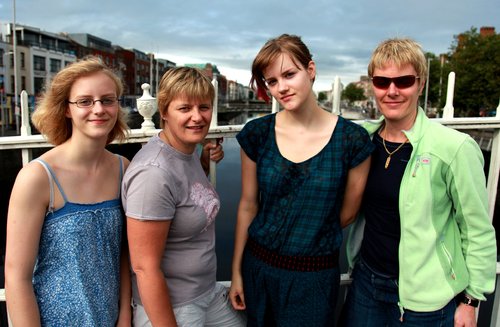
Studies - including Marriage Equality's own Voices of Children - have proven that children raised by two mums or two dads do just as well as children raised by a mother and a father. The most important factor is that a child is raised in a loving, supportive and nurturing home, whether that is in a one or two parent household, and regardless of the sexuality of the parents.
In a 2008 poll, 70% of people surveyed agreed that being raised in a loving home is more important than being raised by a mother and a father. (source: Lansdowne Market Research, cited in It's No Joke: Civil Marriage Rights for Lesbians and Gay Men in Ireland, 2009)
The Irish Constitution pledges to give special protection and recognition to the Family. There is no reason why same sex families could not be included in this definition, as these families are just as deserving of recognition and protection as any other families.
Click here to find out more about the children of same sex couples.
Extending civil marriage to same sex couples would require a referendum to change the Irish Constitution
The Constitutional Convention
The Irish Government has promised to look at the issue of marriage equality (among other issues) as part of the Constitutional Convention, beginning in 2013.
The Convention had its first meeting on Saturday 1st December 2012, and discussions on the first two issues (voting age and presidential term) are to start in early 2013. Marriage Equality and our supporters have been asking TDs and Senators to ensure that marriage equality is dealt with as soon as possible and we are hoping that it will be the 3rd or 4th issue to be looked at. This leaves us with a time-frame of in or around March/April 2013.
Once the issue of marriage equality has been explored and voted upon, the Convention, as per its Terms of Reference, will submit its recommendation to Government within two months on whether it should be provided for in the Constitution. Government has then promised to publish its decision on what it proposes to do with the recommendation within 4 months, so at this point they could decide on whether or not they will hold a referendum on the issue. All in all the work of the Convention will take 12 months.
To learn more about the Constitutional Convention and how you can get involved, please click here.
Court Challenges
As mentioned above in the Definition of Marriage section, the Irish Constitution does not actually define marriage to either include or exclude same sex couples. It is the 2004 Civil Registration Act that defines marriage as between a man and a woman.
The Irish courts have interpreted the Constitution as inferring that marriage is between a man and a woman; however, it is now open to them to change this view in line with modern Irish society, public opinion, and many countries around the world who already have marriage equality.
 Photo by Emily Quinn & used with permission of GCNAn important court case around the definition of marriage is the Zappone & Gilligan case. In this case, Katherine Zappone and Ann Louise Gilligan are arguing for the right to be legally recognised in Ireland as a married couple (they are legally married in Canada, but classed as "Civil Partners" in Ireland).
Photo by Emily Quinn & used with permission of GCNAn important court case around the definition of marriage is the Zappone & Gilligan case. In this case, Katherine Zappone and Ann Louise Gilligan are arguing for the right to be legally recognised in Ireland as a married couple (they are legally married in Canada, but classed as "Civil Partners" in Ireland).
In June 2012, Senator Katherine Zappone and Dr Ann Louise Gilligan decided to issue a fresh legal challenge in their fight to be married under Irish law. The new challenge will test the provisions of the Civil Registration Act 2004 and Civil Partnership Act 2010 which prohibit marriage for same-sex couples. Fresh proceedings will be issued in the High Court in order to challenge - among other issues - the constitutionality of the Civil Registration Act 2004, which marked the first time marriage was defined in Irish statute as between a man and a woman, and the Civil Partnership Act, which prohibits people who have registered a civil partnership from marrying.
For more information on the Zappone & Gilligan case, please click here.
In any event, Marriage Equality will continue to keep the pressure on the Government to make marriage equality a reality for same sex couples one way or another (ie: with or without a referendum).
Marriage Equality shares the opinion of some of Ireland's finest constitutional lawyers, who see no constitutional impediment to providing marriage equality.
Ultimately there is no substance to the argument that providing equality for same-sex couples is unconstitutional. In fact, the Irish Constitution upholds equality for ALL its citizens.



 Marriage Equality is a proud member of NELFA
Marriage Equality is a proud member of NELFA